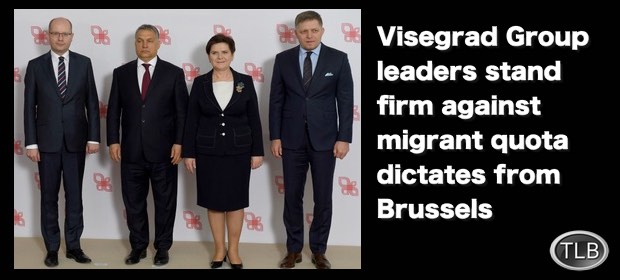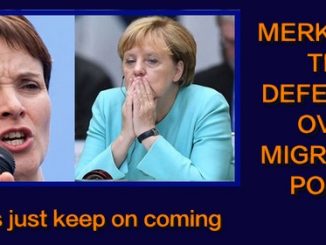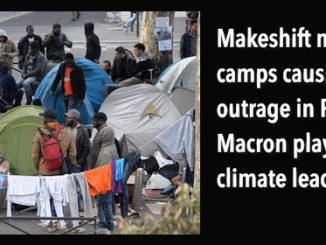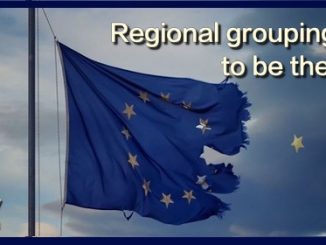
Europe’s Migrant Crisis: Views from Central Europe
“We are not going to take part in the madness of the Brussels elite.”
SOEREN KERN
- Many so-called asylum seekers have refused to relocate to Central and Eastern Europe because the financial benefits there are not as generous as in France, Germany or Scandinavia. In addition, hundreds of migrants who have been relocated to Estonia, Latvia and Lithuania, which rank among the poorest EU countries, have since fled to Germany and other wealthier countries in the bloc.
- “It needs to be said clearly and directly: This is an attack on Europe, on our culture, on our traditions.” — Poland’s Prime Minister Beata Szydło.
- “I think we have a right to decide that we do not want a large number of Muslim people in our country. That is a historical experience for us.” — Viktor Orbán, Prime Minister of Hungary, referring to Hungary’s occupation by the Ottoman Empire from 1541 to 1699.
The European Union has initiated legal action against the Czech Republic, Hungary and Poland for failing to comply with a controversial order to take in thousands of migrants from Africa, Asia and the Middle East.
The so-called infringement procedure, which authorizes the European Commission, the powerful executive arm of the European Union, to sue member states that are considered to be in breach of their obligations under EU law, could lead to massive financial penalties.
The dispute dates back to September 2015, when, at the height of Europe’s migration crisis, EU member states narrowly voted to relocate 120,000 “refugees” from Italy and Greece to other parts of the bloc. This number was in addition to a July 2015 plan to redistribute 40,000 migrants from Italy and Greece.
Of the 160,000 migrants to be “shared,” nine countries in Central and Eastern Europe were ordered to take in around 15,000 migrants. Although the Czech Republic, Hungary, Romania and Slovakia voted against the agreement, they were still required to comply.
Since then, several Central European EU member states have vehemently refused to accept their assigned quotas of migrants. Poland, for example, has a quota of 6,182 migrants, not one of whom has been admitted. The Czech Republic has a quota of 2,691 migrants, of whom only 12 have been taken. Hungary has a quota of 1,294, none of whom have been admitted.
In the EU as a whole, so far only around 20,000 migrants have been relocated (6,896 from Italy and 13,973 from Greece), according to the EU’s latest relocation and resettlement report, published on June 13, 2017. Of the 28 EU member states, only Malta has taken in its full quota — 131 migrants.
Many so-called asylum seekers have refused to relocate to Central and Eastern Europe because the financial benefits there are not as generous as in France, Germany or Scandinavia. In addition, hundreds of migrants who have been relocated to Estonia, Latvia and Lithuania, which rank among the poorest countries in the EU, have since fled to Germany and other wealthier countries in the bloc.
Meanwhile, the enforcers of European “unity” have sought to shame the Central European holdouts into compliance by appealing to nebulous concepts such as European “values” and “solidarity.” French President Emmanuel Macron, for example, recently warned:
“European countries that do not respect the rules should pay the full political consequences. There is a double betrayal. They decide to abandon EU principles, turn their back on Europe and have a cynical approach to the union which gives them money, without respecting its values.”
Leaders in Central and Eastern Europe have held their ground. In Poland, Prime Minister Beata Szydło said her country would not be blackmailed by European Union officials. In a speech to Parliament on May 24, two days after the jihadist attack in Manchester, England, in which a Polish couple was killed, she said:
“We are not going to take part in the madness of the Brussels elite…. Rise from your knees and from your lethargy or you will be crying over your children every day.
“If you cannot see this — if you cannot see that terrorism currently has the potential to hurt every country in Europe, and you think that Poland should not defend itself — you are going hand in hand with those who point this weapon against Europe, against all of us.
“It needs to be said clearly and directly: This is an attack on Europe, on our culture, on our traditions. Do we want strong politicians who can see the danger and can fight against it efficiently?”
In a May 24 speech, Polish Prime Minister Beata Szydło said her country would not be blackmailed by European Union officials: “We are not going to take part in the madness of the Brussels elite… This is an attack on Europe, on our culture, on our traditions.” (Illustrative image source: European Parliament/Flickr)
Polish Interior Minister Mariusz Błaszczak said that agreeing to European Union quotas would “certainly be worse” than any punishment meted out by Brussels:
“We must not forget the terror attacks that have taken place in Western Europe, and how — in the bigger EU countries — these are unfortunately now a fact of life. Remember, that the now very numerous Muslim communities in Western Europe started out as relatively small numbers….
“I tell my counterparts in Western Europe that the relocation strategy only intensifies illegal migration because traffickers get even more customers when would-be migrants hear that people delivered to Europe are being given refuge in EU nations other than Italy and Greece.”
Henryk Kowalczyk, a Polish member of parliament, said:
“Poland makes a contribution to the EU…. We are doing what the bloc says, what the treaties say. If the French president was thinking of refugees, well that issue is not mentioned in the treaties and when we joined the European Union we were not taking on that commitment.”
Poland’s European Affairs Minister Konrad Szymański added: “There is no conflict of values between the Commission and Poland — it is about how to interpret these values.”
In the Czech Republic, Prime Minister Bohuslav Sobotka said that “given the deteriorating security situation in Europe and the non-functioning of the quota system, the Czech government will not participate in it.” He added: “We are ready to defend our position in the EU and the relevant judicial institutions.”
Czech Minister of Foreign Affairs Lubomír Zaorálek said that EU should focus on “economic and social convergence among EU countries, rather than attempts to distribute migrants with forced quotas.” He pointed out that in some Eastern European countries, “the most vulnerable inhabitants are often poorer than the incoming migrants themselves.”
CONTINUE READING HERE
ER recommends other articles by The Gatestone Institute
About the author
Soeren Kern is a Senior Fellow at the New York-based Gatestone Institute. Follow him onFacebook and on Twitter. Follow Soeren Kern on Twitter and Facebook





